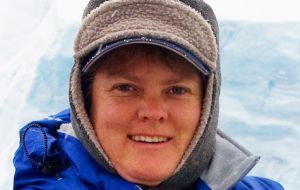MercoPress. South Atlantic News Agency
IAATO Environmental Manager resigns to focus on PhD
 “Claudia (pic) has had a big impact on the association over the last two and a half years with her fresh ideas, knowledge and experience of the Antarctic tourism industry.” said
“Claudia (pic) has had a big impact on the association over the last two and a half years with her fresh ideas, knowledge and experience of the Antarctic tourism industry.” said  Dr Kim Crosbie, IAATO Executive Director praised Claudia's contribution with her fresh ideas, knowledge and experience of the Antarctic tourism industry
Dr Kim Crosbie, IAATO Executive Director praised Claudia's contribution with her fresh ideas, knowledge and experience of the Antarctic tourism industry Claudia Holgate, Environmental Manager for the International Association of Antarctica Tour Operators (IAATO), has decided to step down from the position, which has grown to become full time.
Holgate said, “this has been a tremendously difficult decision for me because I have such great respect for IAATO. However, I have long had aspirations to complete my PhD and will continue to work as a lecturer onboard expedition cruise ships where I feel I can make a difference by inspiring environmental awareness in travelers.”
“Claudia has had a big impact on the association over the last two and a half years with her fresh ideas, knowledge and experience of the Antarctic tourism industry.” said Dr Kim Crosbie, IAATO Executive Director.
“Examples include her input into our Strategic Plan, Field Staff Online Assessment and orchestrating a recent Risk Assessment Workshop at our Annual Meeting. She was a valued team member, contributing to IAATO’s continued success in managing Antarctic tourism in a safe, environmentally responsible way. She will be greatly missed. We wish her the best in her future endeavors.”
IAATO now seeks a new, full-time Environmental Manager.
IAATO is a member organization founded in 1991 to advocate, promote and practice safe and environmentally responsible private-sector travel to the Antarctic. The organization currently has 116 members. IAATO Members work together to develop, adopt and implement operational standards that mitigate potential environmental impacts.
Numerous guidelines have been adopted over the last 20 years that have proven to be successful methods in avoiding such impacts. These include but are not limited to: site specific guidelines, site selection criteria, passenger to staff ratios, limiting numbers of passengers ashore, boot washing guidelines and the prevention of the transmission of alien organisms, wilderness etiquette, garbage policy, ship scheduling and vessel communication procedures, emergency medical evacuation procedures, emergency contingency plans, reporting procedures, marine wildlife watching guidelines, station visitation policies and more.




Top Comments
Disclaimer & comment rulesCommenting for this story is now closed.
If you have a Facebook account, become a fan and comment on our Facebook Page!